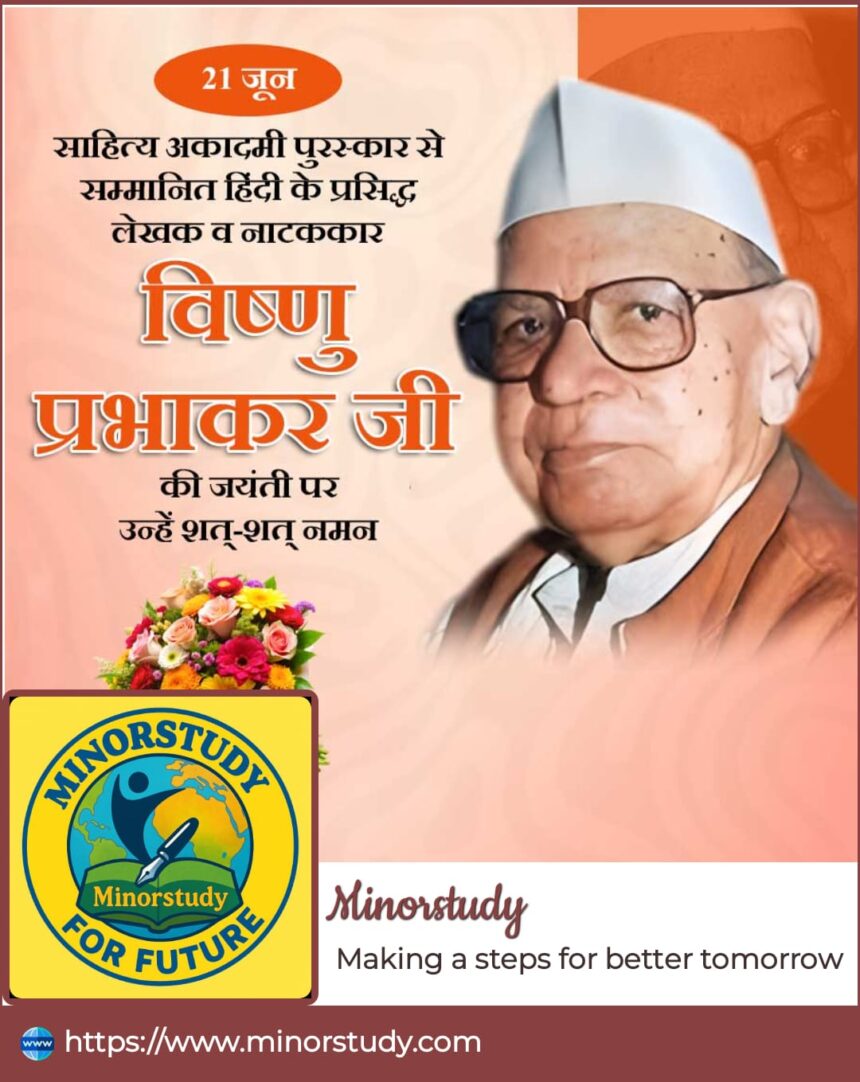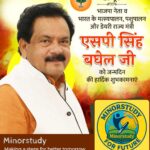✨ Introduction: Honoring a Pillar of Modern Hindi Literature
Vishnu Prabhakar: Born on June 21, 1912, in Miranpur (then United Provinces), Vishnu Prabhakar emerged as one of the most versatile and Gandhian-minded figures in modern Hindi literature. Whether writing short stories, novels, plays, or travelogues, he consistently radiated patriotism, social conscience, and literary depth. A recipient of the Sahitya Akademi Award, Padma Bhushan, and more, his works remain relevant, offering both inspiration and human insight.
- ✨ Introduction: Honoring a Pillar of Modern Hindi Literature
- 🌍 A Journey Through Time: Biography & Timeline
- 🧠 9 Remarkable Facts About His Life & Work
- ❓ FAQs: Insightful Queries Answered
- 💡 Significance in Life & Society
- 🎉 Wishing & Remembering Vishnu Prabhakar
- 🔄 Daily Life & Cultural Impact
- 📌 Key Takeaways
- 🔚 Conclusion: Celebrating a Beacon of Brilliance
Join me as we explore his journey, his impact on Indian society, and the legacy that continues to enlighten readers today.
🌍 A Journey Through Time: Biography & Timeline
| Year | Milestone |
|---|---|
| 1912 (June 21) | Born in Miranpur, Muzaffarnagar, UP news.iitgn.ac.in+4en.wikipedia.org+4edubilla.com+4news.iitgn.ac.in+2edubilla.com+2paperbackswap.com+2 |
| 1929 | Matriculates from Hisar at age 16 |
| Early 1930s | Works as a gas-department clerk earning ₹18/month, studies Hindi & Sanskrit, passes Prabhakar exam |
| 1931 | First story “Diwali” published in Hindi Milap |
| 1938 | Marries Sushila Prabhakar, who inspires him until 1980 |
| 1939 | First play Hatya Ke Baad staged |
| 1955–57 | Serves as drama director at All India Radio, New Delhi |
| 1974 | Publishes acclaimed biography Awara Masiha on Sharat Chandra Chatterjee |
| 1992 | Releases Ardhanarishwar, which later wins Sahitya Akademi Award |
| 1993 | Wins Sahitya Akademi Award |
| 1995 | Receives Mahapandit Rahul Sankrityayan Award |
| 2004 | Honored with Padma Bhushan |
| 2009 (April 11) | Passes away in New Delhi at 96; body donated per his wishes |
| 2005 | Notably threatens to return Padma Bhushan over a Presidential misconduct incident |
🧠 9 Remarkable Facts About His Life & Work
Versatile Writers’ Universe – Authored over 70 books across genres: novels, short stories, plays, biographies, essays, and more sahitya-akademi.gov.in.
Gandhian Ideals – Embodied nonviolence, portrayed oppressed yet noble characters, and opposed corruption in his narratives paperbackswap.com+3edubilla.com+3siliconindia.com+3.
Name Transformation – His real name Vishnu changed multiple times until an editor added “Prabhakar” to honor his Hindi qualification siliconindia.com+4paperbackswap.com+4kids.kiddle.co+4.
Education Against Odds – While working as a clerk, he still completed Hindi (Prabhakar), Sanskrit (Pragya), and BA in English edubilla.com.
Acclaimed Works – Ardhanarishwar (1992), a bold 1200-page novel on the psyche and social mind, won Sahitya Akademi and later Padma Bhushan edubilla.com+6en.wikipedia.org+6timesofindia.indiatimes.com+6.
Biographical Mastery – Awara Masiha (1974), a biography of Sarat Chandra Chattopadhyay, earned him the Soviet Land Nehru Award exoticindiaart.com+6edubilla.com+6kids.kiddle.co+6.
Media Influence – As All India Radio’s drama director (1955-57), he shaped India’s national radio programming paperbackswap.com+4kids.kiddle.co+4siliconindia.com+4.
Cultural Integrity – Always wore a Gandhi cap, refusing political affiliations while keeping Gandhian simplicity alive siliconindia.com+1siliconindia.com+1.
Last Literary Bridge – Critics called him the last link between pre- and post-Independence Hindi literature siliconindia.com+2siliconindia.com+2tribuneindia.com+2.
❓ FAQs: Insightful Queries Answered
Q1. What are his most celebrated works?
A: Ardhanarishwar (1992) is his magnum opus; Awara Masiha (1974) also stands out for biographical depth .
Q2. Which awards did he receive?
Sahitya Akademi Award (1993), Mahapandit Rahul Sankrityayan Award (1995), Padma Bhushan (2004), Soviet Land Nehru Award (1976) .
Q3. Why was he Gandhian?
His writing fulfilled Gandhian values: nonviolence, social uplift, humility, and simplicity en.wikipedia.org+7siliconindia.com+7siliconindia.com+7.
Q4. Did he ever protest publicly?
Yes—he nearly returned his Padma Bhushan in 2005 over protocol misconduct during a Presidential ceremony siliconindia.com+1siliconindia.com+1.
Q5. How did he wish to be remembered?
He asked that his body be donated to AIIMS—reflecting lifelong altruism timesofindia.indiatimes.com.
💡 Significance in Life & Society
Literary Enrichment: Fused traditional values with contemporary issues—from gender equity to rural malaise.
Social Motivation: Inspired readers toward ethical living, patriotism, and inclusion.
Cultural Preservation: Promoted Hindi but wrote in accessible, culturally resonant terms.
Media Innovation: Elevated radio drama to thought-provoking storytelling.
Educational Catalyst: His life story—self-study while in government service—is a lesson in perseverance.
🎉 Wishing & Remembering Vishnu Prabhakar
“May the brilliance of your words guide generations—ever grateful, Mr. Vishnu Prabhakar.”
“Your stories taught kindness, courage, and truth—today, we honor your legacy.”
“Wishing your soul eternal peace—your life reminds us how to live with integrity.”
“Celebrating your talent and humanity, Sir—may readers continue to find inspiration in your pen.”
🔄 Daily Life & Cultural Impact
Reading Culture: Encourages Hindi literature lovers to explore complex, socially aware works.
Media Influence: His All India Radio period still impacts radio drama creators.
Educational Paths: Self-study and continuous learning remain a potent example.
Value-Based Living: His Gandhian simplicity and charity model humane public conduct.
Gender & Society: Works like Ardhanarishwar initiate dialogue on gender and social equity.
📌 Key Takeaways
Vishnu Prabhakar was a bridge between eras—rooted in Gandhian values, modern in thought.
His works were vast, inclusive, and socially conscientious across genres.
Even with acclaim, he lived simply—his values aligned with his actions.
His legacy fuels Hindi literary pride, social responsibility, and ethical leadership.
🔚 Conclusion: Celebrating a Beacon of Brilliance
Mr. Vishnu Prabhakar embodied the power of literature to uplift, to question, and to heal. He lived the values he wrote about: discipline, learning, compassion, and integrity. Today, as the world evolves, his voice echoes as a timeless reminder: words can build society, touch hearts, and inspire transformation.
May his brilliance continue to shine, guiding hearts toward truth, unity, and human dignity.








